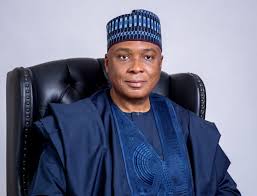Former Senate President Bukola Saraki has said he was harassed and intimidated by former President Muhammadu Buhari’s administration because he opposed the government’s excessive borrowing habits.
Speaking over the weekend at the 2025 Reunion Gala of the King’s College Old Boys Association (KCOBA) in Houston, Texas, Saraki said both Nigeria’s elite and ordinary citizens failed to speak up during his ordeal, leading to a more subdued National Assembly today.
“Under my leadership, the legislature was silenced, harassed, assaulted, bullied, and blackmailed. The executive deliberately frustrated laws and policies that would have benefitted the country,” he said.
Saraki claimed his experience has made his successors wary of confronting the executive. “Today, Senate presidents have become rubber stamps. Nobody wants to go through what I went through,” he said, referring to the hostile relationship between the 8th National Assembly and the Buhari administration from 2015 to 2019.
The former Kwara State governor, who received the Rex E. O. Akpofure Award for Outstanding Achievement at the event, also criticized political leaders who, according to him, come into office without clear policies or vision.
“Our country is being governed on whims or advice from so-called government consultants who latch onto every administration,” Saraki noted. He urged Nigerians, especially professionals, to engage actively in politics and governance. “We must reject the idea that politics is dirty. We must intervene, support credible candidates, and hold leaders accountable.”
He emphasized the need for Nigerians to abandon apathy and help build institutions rather than depend on “strong men and women.”
Other dignitaries at the event included the Emir of Kano, Muhammadu Sanusi II; Dr. Oluyinka Olutoye, a renowned Nigerian-American pediatric surgeon; Masai Ujiri, President of the Toronto Raptors; and Dr. Sam Dagogo-Jack, a Nigerian-American physician.
Reflecting on his tenure, Saraki recalled the rocky start of his Senate presidency in 2015, when he emerged against the preference of the ruling All Progressives Congress (APC), backed by opposition senators. The Buhari government later brought multiple legal charges against him, which he believes were politically motivated.
He formally left the APC in 2018 for the Peoples Democratic Party (PDP), citing marginalization and lack of internal democracy. Efforts to remove him from office failed, but his tenure remained characterized by frequent clashes with the executive.
Saraki noted that since his departure, Senate presidents like Ahmad Lawan and Godswill Akpabio have come under criticism for lacking independence and pushing executive bills with little scrutiny.
“Nigeria continues to produce brilliant individuals globally, yet fails as a nation because our best minds avoid politics,” Saraki said, urging citizens to play active roles in shaping the country’s future.
Prior to his U.S. trip, Saraki also commended the ongoing PDP membership registration in Kwara State, describing it as a grassroots-driven movement for change.
“Real change doesn’t happen overnight. It’s the result of ordinary people making the choice to engage,” he said.
Edited by Nzubechukwu Eze









